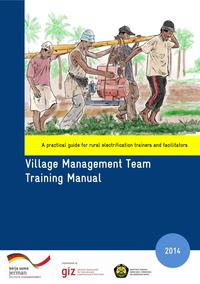Community Management Guide for Mini-grid
Preface
Sustainable development activities in rural area often focus on the utilisation of natural resources, which are directly connected with communities. Natural resources are a community’s “safety net” and are critical to their livelihood. It therefore stands to reason that rural development can only occur if social aspirations and natural resource opportunities (and limitations) are addressed in an interwoven, holistic manner.
Rural electrification using renewable energy sources has become an important part of sustainable development in rural area. Access to modern energy opens new hitherto untapped potentials, both socially and economically. As it is with all potential though, it needs to be harnessed and groomed with care and often coerced into fruition through patience and consistent action.
This manual is a tool. It was formulated, based on several years of experience in Indonesia, and compiled to be user-friendly as well as comprehensive. This tool has one singular objective: to provide rural facilitators and Village Management Team (VMT) members with the means to conduct their challenging tasks.
Content
The manual is intended to be used by community facilitators and trainers on how to establish and capacitate a community of mini-grid management team to maintain and manage a mini-grid. The content of the book is as follow:
- About the manual
- Syllabus components
- Training syllabus
- Training preparation
- Introduction stage
- Learning purpose and process
- Organising class
- Modules
Download the Guide
Further Information
- Mini-grid portal on energypedia
- Indonesia Energy Situation
- PV Mini-grid Inspection Guide
- Solar/PV Mini-grid Programme in Indonesia - Executive Overview
- Skills Development: Clean Energy Qualifications in Nigeria 7 Handbooks and Syllabus & Teacher’s Reference for technicians (2017)




















